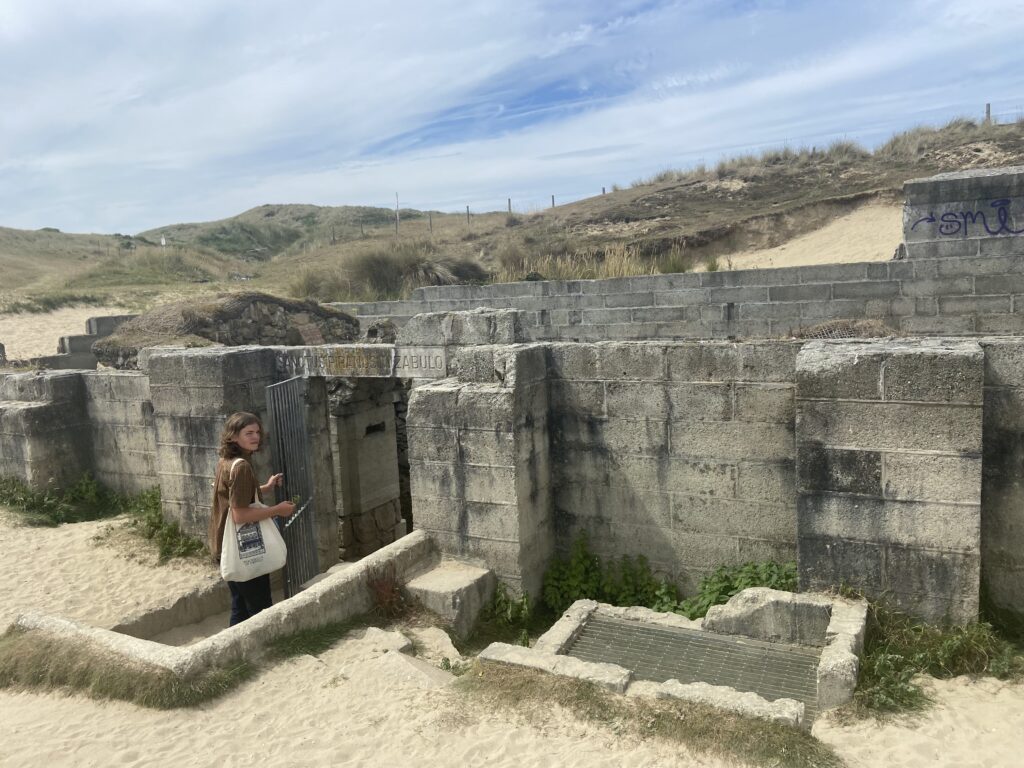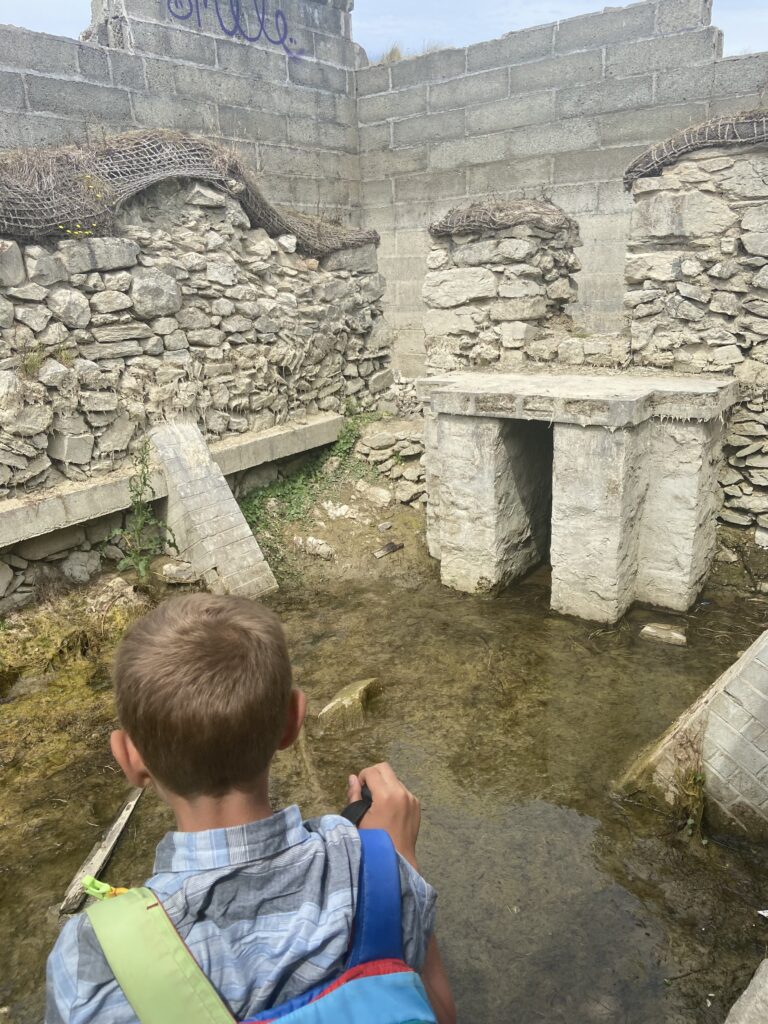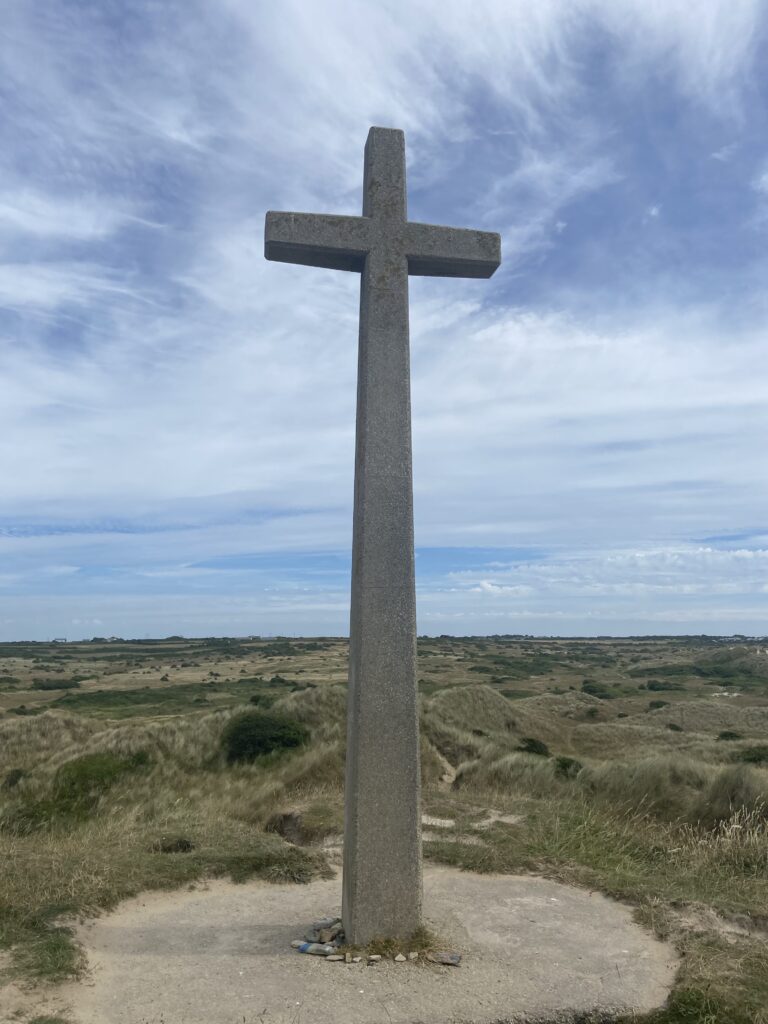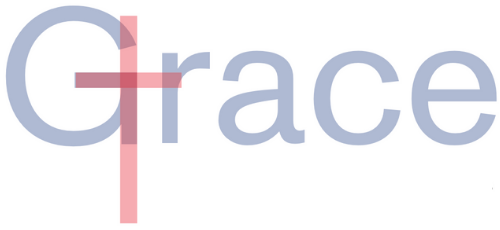
Holy Mud
One of the things I learned about ancient sites on our travels it that you encounter there, not just the history and holiness of the original saint or event which instigated it as a place of pilgrimage, but the layers of history of human interaction with that site over the centuries. At Chartres, this worked to our benefit as we could envision 800 years of feet treading the path of the labyrinth that was closed to us by modern-day seating. At other cathedrals throughout Europe, similar ancient labyrinths were pulled out by frustrated 17th-century priests who became annoyed at the attention they got and their attractiveness to children!
One of the most obscure and fascinating ancient sites we visited was St. Piran’s oratory. While walking forty miles of the Cornish Coastal path, my eldest became fascinated with the local saints. We heard it said that there are “more saints in Cornwall than in heaven!” Every place, it seemed, had its local holy man or woman, most dating from the sixth or seventh century, when scores of Irish missionaries landed in Cornwall to re-Christianize it after the departure of the Romans, and met with a less than warm welcome. Saint Piran was one of those early Irish missionaries who did not meet martyrdom, but lived long enough to become the patron saint of Cornwall. Piran reportedly floated over to Cornwall on a millstone, and was further associated with stone by being credited with accidentally discovering the tin contained in the rocks of Cornwall and (re)launching its mining industry. Piran built a small chapel (“oratory”) in the dunes for his own prayer, and was soon surrounded by enough followers that he had to build a second, larger church.
We knew that the oratory lay somewhere along our path, just off — beach. Walking along the beach, we asked a lifeguard for directions. I was somewhat bamboozled by the directions, which sent us scrambling hand over hand up the high dunes in search of a “big cross on top of a hill— you can’t miss it.” We reached the top of the dunes and found a path, but no cross was in sight. Undaunted, my oldest child left their bags with us and sprinted a half-mile down the fence line to check. Panting, Jacob returned triumphant, and we followed. I had read a little bit about the history of this site, and so was, if not prepared, at least able to understand what we found. In a hollow where the dunes had begun to turn to grassy turf, we came to a cinder-block building with no roof, and an iron gate for a door. Within these modern walls was a small, ancient, mud-brick structure, with an altar at one end, filled with inches of stagnant water and smelly muck. Nearby was a wide, flat, depression where the green things grew thicker, and beyond that the hill with the tall cement cross. St. Piran’s oratory had been a popular pilgrimage destination in the middle ages. Sometime in the last several hundred years, both the small oratory and the larger church he built were forgotten and enveloped by the sand dunes. The Victorians excavated the original oratory, then someone in the early twentieth century thought it had better be protected and enclosed it in the cement structure. Later, that was rethought and the roof removed. Now the site stands largely abandoned, except for a faded National Trust sign, some graffiti, and small gifts left by pilgrims at the cross atop the hill, which marks the roof of the still-buried second chapel.
I was underwhelmed. Given the effort we had gone to to get there and the notoriety of this particular saint, the disrepair of his holy place seemed a shame. That is, until my children’s reactions sank in. You could not step into the mucky chapel, but my 11-year old put his foot in and declared, “This is holy mud! My shoe is holy now!” He asked earnestly, “does this mean I can never wash my shoe?” My 15-year-old walked toward the green depression and declared, “This is where the holy well must have been! This is holy mint!” Carefully they pulled a few sprigs of the mint, which they carried around in a water bottle for the rest of our trip. It survived (miraculously!), rooted itself, and was potted and left for the owner of our AirBnB in London. They found the bone of a small animal and reverently buried it, asking a blessing for whatever creature it came from. We climbed to the cross individually and prayed, leaving offerings of shells and stones we had found along the way. Having arrived in exhaustion and disgust, I left with humility and wonder.

Excavating Meaning
Meaning is a key ingredient of the human experience— we are the only creatures, as far as we know, who tell ourselves stories about the world around us, visible and invisible, and see ourselves as part of a larger story. Meaning, like beauty and the divine, is present everywhere in our world, but is sometimes more obvious than others. Children, with their eagerness and capacity for awe, are sometimes better able to find it. Vaclav Havel, former president of Czechoslovakia, said, “Hope is not the conviction that something will turn out well, but the certainty that something makes sense, regardless of how it turns out.” The certainty that something makes sense, that it has meaning, that it is part of a larger whole, is key to human existence, as crucial, some might say, as food, air, and water.
In the gospel for the third Sunday of Advent, known as “Gaudete” or “Rejoicing” Sunday, we find John the Baptist anything but rejoicing. The fiery prophet who just last week was heard confronting the religious elite in the wilderness and calling people to repentance, is now in a dark prison cell, awaiting Herod’s judgment, which will bring his death. He wonders if he got it right, if his sacrifice will mean anything. He does not see Jesus wielding the ax and calling down the fire on the chaff of Roman occupation and his people’s waywardness, as John told them the Messiah would. I think the darkness of John’s doubt is something many of us can relate to, and both his question and Jesus’ gentle reception of it can offer us hope. Rather than answering John’s question directly (“Yes, you ninny! I’m not the kind of Messiah you thought I would be but I am the Messiah!”), Jesus invites John to see with new eyes. In a paraphrase of the prophet Isaiah, Jesus enjoins John’s disciples to “Go and tell John what you hear and see: the blind receive their sight, the lame walk, the lepers are cleansed, the deaf hear, the dead are raised, and the poor have good news brought to them.” Jesus offers John the parable of his own miracles: John, the Forerunner, is in prison, but Jesus has come to bring freedom. This freedom is for everyone, not for any one group over and against another or at the expense of another. But it starts with the smallest, the least and the last, the downtrodden, the forgotten, and those closest at hand. John’s life and his death will not be for naught: he has announced the light which now shines in the darkness (to quote another John)— and the darkness does not overcome it.
New Eyes
Viktor Frankl, a Jewish psychologist who survived the Nazi death camps, later wrote in his book Man’s Search for Meaning: “Dostoevski said once, ‘There is only one thing I dread: not to be worthy of my sufferings.’ These words frequently came to my mind after I became acquainted with those martyrs whose behavior in camp, whose suffering and death, bore witness to the fact that the last inner freedom cannot be lost. It can be said that they were worthy of the their sufferings; the way they bore their suffering was a genuine inner achievement. It is this spiritual freedom—which cannot be taken away—that makes life meaningful and purposeful.”
We have the freedom in any circumstance to wallow in the muck or to hunt for the holy. And when we have encountered the holy, that experience is ours to take with us— like holy mint in a water bottle, to nurture, to breathe in, to plant and watch grow. And it is that freedom and capacity for meaning that can get us through the dark prison cells of our doubts and our suffering. How can we learn, as Jesus asks John, to see with new eyes?
Practices
On our pilgrimage, I gathered many things: stones, shells, ticket stubs, conversations, photographs, and most of all, experiences. Meaning-making is the practice of sorting through the things we have picked up in life and putting them together in a way that makes sense or is beautiful to us. The process of “shifting the pieces” helps us soak in the encounter(s) with the holy more deeply, and find direction for the future.
Examen. St. Ignatius of Loyola taught a simple (not easy!) prayer practice for the end of a day, which works equally well for the end of a week, a month, a season, a year, a decade, or a pilgrimage of any kind. After asking the Holy Spirit to illuminate your thoughts, try to answer two questions: Where did I feel God’s presence? and Where did I feel God’s absence? Other ways to ask those questions are: Where did I feel the most/least gratitude? Where did I move toward love and where did I move away from it? What felt light and grace-full in my day and what felt heavy or clunky? Journalling or sharing your answers with others will help this meaning settle more deeply.
Lectio. Many of us are familiar with lectio divina, a method of bible study where we look for a word or phrase that “jumps off the page at us.” Another way to approach mining for meaning is to look for what “jumps of the page” of an experience, day or journey for you. Spend time with that moment, vision or experience. How would you describe it using evocative adjectives? What does it remind you of? Do you know why it calls you, what meaning it holds for you? What could it be inviting you to do, be, or change?
Art sometimes gives us access to meaning which is deeper than what we might be able to access with our verbal mind. Even if you don’t consider yourself an artist, as you reflect on a significant experience consider doodling, sketching, painting, choosing colors to represent it. You might look for images in magazines that evoke the experience for you even (especially!) if they don’t seem to have anything to do with it. Talking about your art or journalling about it might help you articulate its meaning.
However you choose to do it, take time to sort through the pieces of life. Gather them and spread them out. Look for patterns; lessons learned. Create beauty out of beauty. Fine-tune the art of listening to what calls your heart. Viktor Frankl observed, “What is demanded of man is not, as some existential philosophers teach, to endure the meaninglessness of life, but rather to bear his incapacity to grasp its unconditional meaningfulness in rational terms.” Unconditional meaningfulness is the truth of the universe we live in. We might capture a thimble-full of it in our deepest reflection. The eyes of the heart, through faith, behold the rest.
Prayer
Merciful God of peace, your word, spoken by the prophets, restores your people’s life and hope: Fill our hearts with the joy of your saving grace, that we may hold fast to your great goodness and proclaim your justice in all the world. Amen.
From Daily Prayer for All Seasons

Poem
The Truelove
There is a faith in loving fiercely
the one who is rightfully yours,
especially if you have
waited years and especially
if part of you never believed
you could deserve this
loved and beckoning hand
held out to you this way.
I am thinking of faith now
and the testaments of loneliness
and what we feel we are
worthy of in this world.
Years ago in the Hebrides,
I remember an old man
who walked every morning
on the grey stones
to the shore of baying seals,
who would press his hat
to his chest in the blustering
salt wind and say his prayer
to the turbulent Jesus
hidden in the water,
and I think of the story
of the storm and everyone
waking and seeing
the distant
yet familiar figure
far across the water
calling to them
and how we are all
preparing for that
abrupt waking,
and that calling,
and that moment
we have to say yes,
except it will
not come so grandly
so Biblically
but more subtly
and intimately in the face
of the one you know
you have to love
so that when
we finally step out of the boat
toward them, we find
everything holds
us, and everything confirms
our courage, and if you wanted
to drown you could,
but you don’t
because finally
after all this struggle
and all these years
you simply don’t want to
any more
you’ve simply had enough
of drowning
and you want to live and you
want to love and you will
walk across any territory
and any darkness
however fluid and however
dangerous to take the
one hand you know
belongs in yours.
— David Whyte

Recent Comments